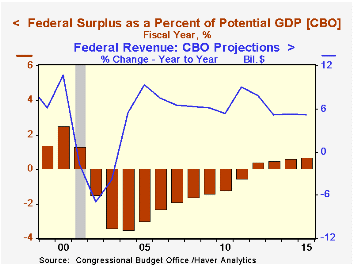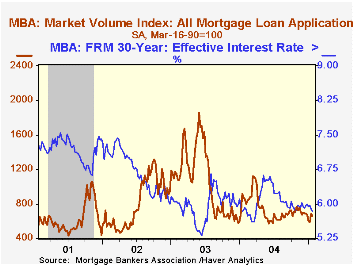 Global| Jan 25 2005
Global| Jan 25 2005CBO Updates US Budget Estimates
by:Tom Moeller
|in:Economy in Brief
Summary
The Congressional Budget Office (CBO) projects that if current laws and policies remained the same, the US federal government would run budget deficits of $368B this year and $295B in 2006. These compare with estimates of $348B and [...]

The Congressional Budget Office (CBO) projects that if current laws and policies remained the same, the US federal government would run budget deficits of $368B this year and $295B in 2006. These compare with estimates of $348B and $298B made in September and reflect roughly offsetting changes in economic and legislative assumptions.
Estimates do not reflect a significant amount of spending for U.S. military operations in Iraq and Afghanistan and for other efforts in the war on terrorism. Spending for these activities is expected to total $30B this year and possibly more in coming years.
For the ten years 2005-2014, the projected deficit fell to $1,364B from the $2,294B estimated in September, which included an extrapolation of spending for the war on terrorism. Budgetary rules do not allow for that inclusion in the new baseline projections. If the extrapolation had been excluded from the September projections, the ten year total deficit would have been $861B.
Federal revenues are projected to grow 9.4% this year (16.8% of GDP) and 7.5% next year. Revenues are projected to continue growing faster than GDP for the next ten years.
Spending is projected to grow 5.8% this year and between 3% and 5% during the next ten years.
Mandatory spending is projected to grow from 54% of total outlays in 2004 to 62% in 2015. Growth of 5.7% per year is principally driven by Medicare & Medicaid outlays which are projected to rise 9.0% and 7.8% annually, respectively, through 2015. Spending growth on Social Security during the ten years is held to 5.6% but annual growth ramps to roughly 6% (versus 4.5% last year) after 2010 due to the retirement of baby-boomers.
Real GDP growth is projected to average 3.2% through 2010 after 3.7% growth this year and 3.8% growth in 2006. CPI growth is projected at 2.2% after 1.9% this year and 2.0% in 2006. The unemployment rate is projected at 5.2%.
CBO's latest Budget & Economic Outlook for the Years 2006 to 2015 can be found here.
The US Budget Deficit: On an Unsustainable Path from the Brookings Institution is available here.
Mortgage Applications Downby Tom Moeller January 26, 2005

Mortgage applications fell 3.6% last week pulling the average level in January 4.3% below the December average according to the Mortgage Bankers Association (MBA) Survey.
Purchase applications fell 2.0% w/w. The second decline in three weeks dropped the January average 9.3% below December. During the last ten years there has been a 59% correlation between the y/y change in purchase applications and the change in new plus existing home sales.
Applications to refinance fell 5.7% w/w but the January average is up 3.2% from December.
The effective interest rate on a conventional 30-year mortgage slipped again to 5.82% versus an average 6.05% during 2004 and 5.95% in December. The effective rate on a 15-year mortgage also fell to 5.34% last week.
The Mortgage Bankers Association surveys between 20 to 35 of the top lenders in the U.S. housing industry to derive its refinance, purchase and market indexes. The weekly survey accounts for more than 40% of all applications processed each week by mortgage lenders. Visit the Mortgage Bankers Association site here.
| MBA Mortgage Applications (3/16/90=100) | 01/21/05 | 01/14/05 | Y/Y | 2004 | 2003 | 2002 |
|---|---|---|---|---|---|---|
| Total Market Index | 658.1 | 682.9 | -24.3% | 735.1 | 1,067.9 | 799.7 |
| Purchase | 439.0 | 448.1 | -2.8% | 454.5 | 395.1 | 354.7 |
| Refinancing | 1,932.8 | 2,048.6 | -41.4% | 2,366.8 | 4,981.8 | 3,388.0 |
Tom Moeller
AuthorMore in Author Profile »Prior to joining Haver Analytics in 2000, Mr. Moeller worked as the Economist at Chancellor Capital Management from 1985 to 1999. There, he developed comprehensive economic forecasts and interpreted economic data for equity and fixed income portfolio managers. Also at Chancellor, Mr. Moeller worked as an equity analyst and was responsible for researching and rating companies in the economically sensitive automobile and housing industries for investment in Chancellor’s equity portfolio. Prior to joining Chancellor, Mr. Moeller was an Economist at Citibank from 1979 to 1984. He also analyzed pricing behavior in the metals industry for the Council on Wage and Price Stability in Washington, D.C. In 1999, Mr. Moeller received the award for most accurate forecast from the Forecasters' Club of New York. From 1990 to 1992 he was President of the New York Association for Business Economists. Mr. Moeller earned an M.B.A. in Finance from Fordham University, where he graduated in 1987. He holds a Bachelor of Arts in Economics from George Washington University.
More Economy in Brief
 Global| Feb 05 2026
Global| Feb 05 2026Charts of the Week: Balanced Policy, Resilient Data and AI Narratives
by:Andrew Cates






